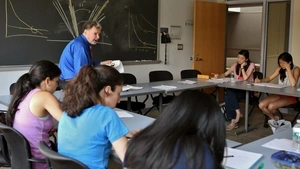Personalized Learning Environment
Small class sizes ensure a richer, more personalized learning experience.

Work with world-class mentors to master education research and assessment techniques to improve policy and practice.

Gain tangible skills and methods needed to perform analysis and research all over the world.
The Quantitative Methods master's program is designed for professionals who have already earned a relevant master's degree and wish to advance their mastery of scale development and assessment, design of randomized field trials and experiments, multivariate statistical analysis, and the production of high-quality evidence for decision-making in public and organizational policy.
| The Quantitative Methods, M.Phil.Ed. program is not accepting applications for Fall 2026. |
Fall Entry Term
Full or Part-Time Enrollment Format
2 Years Duration (full time)
On Campus Modality
The principles and foundations learned in this program prepare students with tangible skills and methods needed to perform analysis and research all over the world. Additionally, this program offers excellent preparation for doctoral studies.
Program graduates are prepared to:
Application Requirements and Deadlines Tuition and Fees Financial Aid
STEM OPT Extension EligibleThis STEM-designated master’s program provides students with an F1 status the opportunity to work in the U.S. for up to 3 years after graduation—1 year of OPT plus a 2-year STEM OPT extension. |
Small class sizes ensure a richer, more personalized learning experience.

Small class sizes ensure a richer, more personalized learning experience.

Time: 12:00 PM - 1:00 PM EST | Location: Online
Time: 9:00 AM - 10:00 AM EST | Location: Online
Time: 12:00 PM - 1:00 PM EST | Location: Online
The Quantitative Methods, M.Phil.Ed. curriculum comprises 16 courses that integrate research methods with policy content. In addition to developing expertise in advanced methods of research, students are required to take distribution courses in fields such as early childhood, reading, science education, education in developed and developing countries, and dropout and risk prevention.
For information on courses and requirements, visit the Quantitative Methods M.Phil.Ed. program in the University Catalog.
We're happy to help! Contact the program manager, Christine P. Lee, cplee@upenn.edu.
Alumni of the M.Phil.Ed. in Quantitative Methods program pursue careers in research and evaluation at state, federal, and international government agencies, as well as in school districts, for-profit or not-for-profit research firms, and NGOs. The principles and foundations learned in this program prepare students with tangible skills and methods needed to perform analysis and research all over the world. Additionally, this program offers excellent preparation for doctoral studies.
A graduate degree from Penn GSE opens up whole new worlds, intellectually as well as professionally. If you are a passionate, innovative, impactful leader—or aspire to be one—Penn GSE is the place for you.

Timothy Victor
Do you have questions about the application, financial aid, or requirements? We're happy to help!